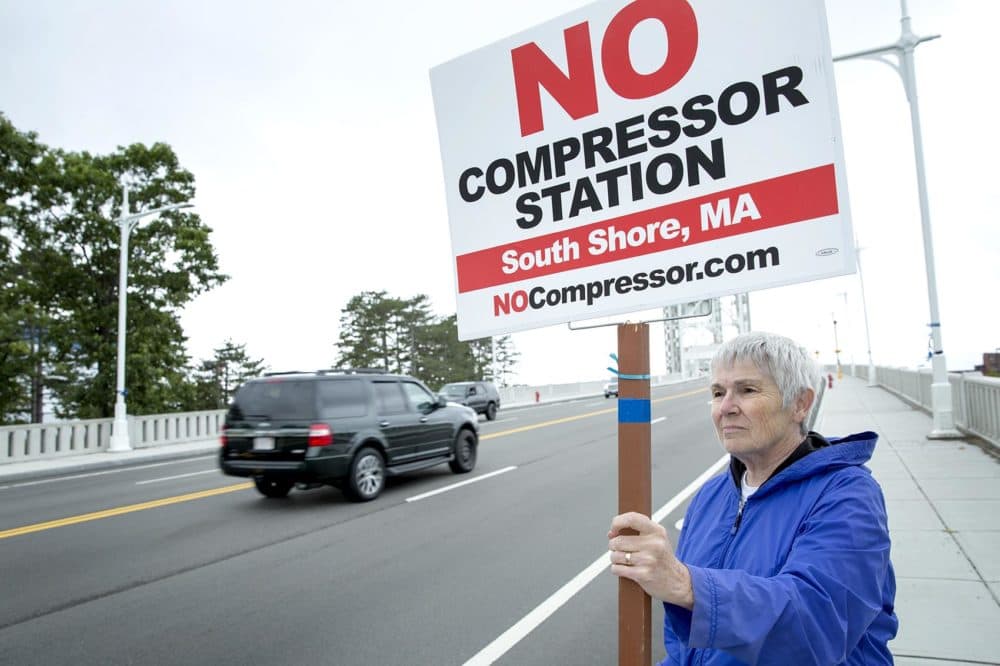Advertisement
New Report Finds More Safety Concerns About Proposed Weymouth Compressor Station

A new report released Monday concludes that building a natural gas compressor station on the proposed site in Weymouth would be "inappropriate," and pose undue public safety and emergency response risks.
The report, from the advocacy group Greater Boston Physicians for Social Responsibility (GBPSR), said the location in the Fore River Basin is too densely populated for additional heavy infrastructure and could not be safely evacuated in an emergency.
"It doesn't make a lot of sense to any public health experts I've spoken with, or any emergency response people, to build potentially explosive infrastructure wedged between diesel fuel tanks, 900 households, 3,000 kids going to school, poor access in and out," said Matt Bivens, a co-author of the report and director of emergency medical services for the Southcoast Hospitals Group. "It's a bad idea."
Energy giant Enbridge wants to build the compressor station as part of its Atlantic Bridge project to expand natural gas pipeline capacity to New England and Canada.
Enbridge spokeswoman Marylee Hanley said in an email that the compressor station "will be constructed, operated, and maintained to meet or exceed federal safety standards and regulations."
Compressor stations are potentially explosive — one caused an explosion and fire in Michigan in January — and are rarely built in densely populated areas. The report noted that 964 households sit within a half-mile of the potential Weymouth site; elderly housing, nursing homes, a mental-health facility and schools with 3,100 students fall within 1.2 miles.
"We consider it highly doubtful that enough emergency transportation could be available to make a timely evacuation of school children, senior citizens in elderly housing, mental health patients, and nursing home patients if an accident were to occur," read the report.
Bivens said the report drew on the GBPSR's expertise in mass casualty medicine and disaster preparedness, as well as construction plans and interviews with local EMS, police, fire and town officials. It followed a report by the group that raised concerns about air quality issues and the proposed compressor.
"We were surprised and alarmed at the public safety aspects," said Bivens. "The more we talked with local police and fire and EMS and town officials, the more we realized that it's at least as big a problem as the air quality question."
The report echoed concerns expressed by local government and public safety officials in Weymouth and neighboring towns.
At a Local Emergency Planning Committee meeting last October, Weymouth Fire Chief Keith Stark called the proposed site a "high-risk hazard area" and expressed concern about how his department would be able to respond to an emergency.
"I think that we need to look at how would we afford costs, training, equipment, personnel to respond to an incident like this," said Stark at the meeting. "I think that we should really look at putting [the compressor station] out somewhere that it's not going to affect anybody."
The Fore River Bridge, which connects Quincy and Weymouth, is also near the proposed compressor site. The new report noted that cars on the bridge could be ignited in an explosion, adding to concerns about emergency response.
"What happens when there is an emergency where the bridge is unable to go down and allow law enforcement and other agencies to come help us, what route are they going to take?" asked Weymouth police community outreach officer Jennifer Pompeo at the October meeting.
GBPSR requested the Baker administration slow down the project and conduct an independent safety review.
In a 2017 letter to Weymouth Mayor Robert Hedlund, Gov. Charlie Baker noted that the federal Department of Transportation's Pipeline and Hazardous Materials Safety Administration (PHMSA) is ultimately in charge of ensuring the project is constructed and operated safely. The letter also stated that "federal regulators should hear firsthand — and then address — the concerns raised by community members."
A public meeting with representatives from PHMSA, state and local officials and first responders has been scheduled for June 20 in Weymouth.
Weymouth town solicitor Joseph Callanan said the town is trying to put their safety concerns in front of "everyone who needs to hear this." He hopes the June meeting will offer that opportunity.
"One of these regulators needs to hear this information and understand this information and tell the people of Weymouth that despite that information, this project is safe."
Lexi Peery contributed reporting to this story.
To see more environmental coverage from WBUR, follow Earthwhile on Twitter and Facebook.
